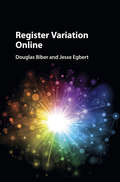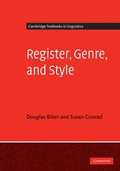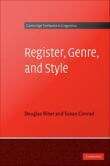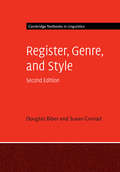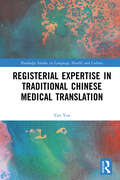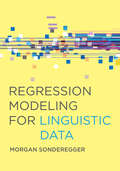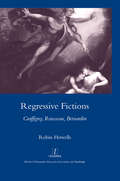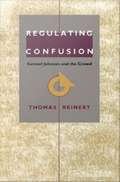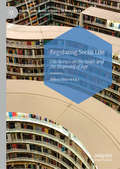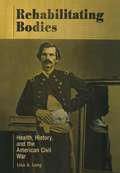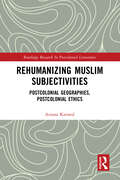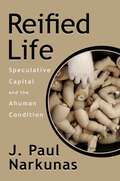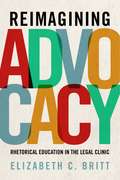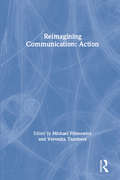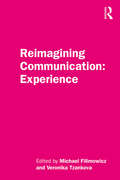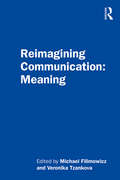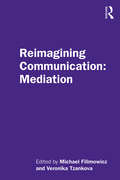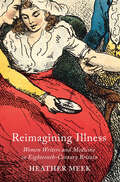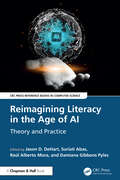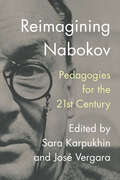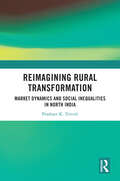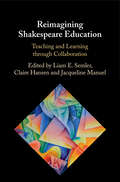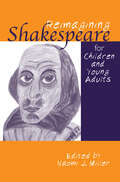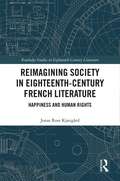- Table View
- List View
Register Variation Online
by Douglas Biber Jesse EgbertWhile other books focus on special internet registers, like tweets or texting, no previous study describes the full range of everyday registers found on the searchable web. These are the documents that readers encounter every time they do a Google search, from registers like news reports, product reviews, travel blogs, discussion forums, FAQs, etc. Based on analysis of a large, near-random corpus of web documents, this monograph provides comprehensive situational, lexical, and grammatical descriptions of those registers. Beginning with a coding of each document in the corpus, the description identifies the registers that are especially common on the searchable web versus those that are less commonly found. Multi-dimensional analysis is used to describe the overall patterns of linguistic variation among web registers, while the second half of the book provides an in-depth description of each individual register, including analyses of situational contexts and communicative purposes, together with the typical lexical and grammatical characteristics associated with those contexts.
Register, Genre, and Style
by Douglas Biber Susan ConradThis book describes the most important kinds of texts in English and introduces the methodological techniques used to analyse them. Three analytical approaches are introduced and compared, describing a wide range of texts from the perspectives of register, genre and style. The primary focus of the book is on the analysis of registers. Part 1 introduces an analytical framework for studying registers, genre conventions, and styles. Part 2 provides detailed descriptions of particular text varieties in English, including spoken interpersonal varieties (conversation, university office hours, service encounters), written varieties (newspapers, academic prose, fiction), and emerging electronic varieties (e-mail, internet forums, text messages). Finally, Part 3 introduces advanced analytical approaches using corpora, and discusses theoretical concerns, such as the place of register studies in linguistics, and practical applications of register analysis. Each chapter ends with three types of activities: reflection and review activities, analysis activities, and larger project ideas.
Register, Genre, and Style
by Douglas Biber Susan ConradThis book describes the most important kinds of texts in English and introduces the methodological techniques used to analyse them. Three analytical approaches are introduced and compared, describing a wide range of texts from the perspectives of register, genre and style. The primary focus of the book is on the analysis of registers. Part 1 introduces an analytical framework for studying registers, genre conventions, and styles. Part 2 provides detailed descriptions of particular text varieties in English, including spoken interpersonal varieties (conversation, university office hours, service encounters), written varieties (newspapers, academic prose, fiction), and emerging electronic varieties (e-mail, internet forums, text messages). Finally, Part 3 introduces advanced analytical approaches using corpora, and discusses theoretical concerns, such as the place of register studies in linguistics, and practical applications of register analysis. Each chapter ends with three types of activities: reflection and review activities, analysis activities, and larger project ideas.
Register, Genre, and Style (Cambridge Textbooks in Linguistics)
by Douglas Biber Susan ConradA fully updated and expanded second edition of this flagship work, which introduces methodological techniques to carry out analyses of text varieties, and provides descriptions of the most important text varieties in English. Part I introduces an analytical framework for studying registers, genre conventions, and styles, while Part II provides more detailed corpus-based descriptions of text varieties in English, including spoken interpersonal varieties, general and professional written varieties and emerging electronic varieties. Part III introduces more advanced analytical approaches and deals with larger theoretical concerns, such as the relationship between register studies and other sub-disciplines of linguistics, and practical applications of register analysis. A new chapter on EAP and ESP has been added, with new sections on the important differences between academic writing in the humanities and sciences, and a case study on engineering reports as an ESP register and genre. Coverage of new electronic registers has been updated, and a new analysis of hybrid registers has been added.
Registerial Expertise in Traditional Chinese Medical Translation (Routledge Studies in Language, Health and Culture)
by Yan YueYue’s book explores the nature of translation using traditional Chinese medicine (TCM) and the TCM classic Huangdi Neijing and its various translations. Yue examines in great detail and depth the important factors that cause the differences in the translators’ treatment of language indeterminacies. Apart from having multi-faceted and fine-grained linguistic analysis, this book also serves as a good model of methodology, in terms of corpus building, contrastive analysis, exemplification, and glossing following systemic functional linguistics (SFL) convention. This book is an argument for greater emphasis on the linguistic notion of register in translator’s expertise, specifically in the way that professional experience and training – with their registerial demands – may be the key to semantic decisions forced on a translator by the inevitable vagaries and indeterminacies of establishing a working “equivalence” across languages and cultures and deep time. It probes the issue in an extreme case: the debate over who is the “ideal” translator in Chinese medicine translation through various case studies. The result suggests it is possible to demonstrate, empirically, that clinical experience in translators is likely to have consistent, or even measurable, consequences.This book will be of interest to three different fields: translators in training, applicable systemic functional linguistics, and traditional Chinese medicine communication.
Regression Modeling for Linguistic Data
by Morgan SondereggerThe first comprehensive textbook on regression modeling for linguistic data offers an incisive conceptual overview along with worked examples that teach practical skills for realistic data analysis.In the first comprehensive textbook on regression modeling for linguistic data in a frequentist framework, Morgan Sonderegger provides graduate students and researchers with an incisive conceptual overview along with worked examples that teach practical skills for realistic data analysis. The book features extensive treatment of mixed-effects regression models, the most widely used statistical method for analyzing linguistic data. Sonderegger begins with preliminaries to regression modeling: assumptions, inferential statistics, hypothesis testing, power, and other errors. He then covers regression models for non-clustered data: linear regression, model selection and validation, logistic regression, and applied topics such as contrast coding and nonlinear effects. The last three chapters discuss regression models for clustered data: linear and logistic mixed-effects models as well as model predictions, convergence, and model selection. The book&’s focused scope and practical emphasis will equip readers to implement these methods and understand how they are used in current work.The only advanced discussion of modeling for linguistsUses R throughout, in practical examples using real datasetsExtensive treatment of mixed-effects regression modelsContains detailed, clear guidance on reporting modelsEqual emphasis on observational data and data from controlled experimentsSuitable for graduate students and researchers with computational interests across linguistics and cognitive science
Regressive Fictions: Graffigny, Rousseau, Bernardin
by Robin Howells"In a cultural shift around the mid-point of the French eighteenth century, the mode of wit is increasingly displaced by bourgeois pathos. Social sophistication and sexual experience are rejected in favour of a retreat into ideal imagination. Instead of the novel of worldliness, we encounter fictions of better worlds: original, natural, familial, innocent and harmonious, protected against reality and time. The regressive shift is traced in this study in general terms, and then through detailed analysis of three of the best-selling novels of the period. The turning-point is represented by Mme de Graffignys Lettres dune Peruvienne (1747, 1752) with its profound ambivalence towards knowledge. A new order is revealed and set out, but still declared lacking, in Rousseaus Julie, ou la Nouvelle Heloise (1761). The visionary return to the organic wholeness of nature is offered by Bernardins Paul et Virginie (1788)."
Regulating Confusion: Samuel Johnson and the Crowd
by Thomas ReinertWith the urbanization of eighteenth-century English society, moral philosophers became preoccupied with the difference between individual and crowd behavior. In so doing, they set the stage for a form of political thought divorced from traditional moral reflection. In Regulating Confusion Thomas Reinert places Samuel Johnson in the context of this development and investigates Johnson's relation to an emerging modernity. Ambivalent about the disruption, confusion, perplexity, and boundless variety apparent in the London of his day, Johnson was committed to the conventions of moral reflection but also troubled by the pressure to adopt the perspective of the crowd and the language of social theory. Regulating Confusion explores the consequences of his ambivalence and his attempt to order the chaos. It discusses his critique of moral generalizations, concept of moral reflection as a symbolic gesture, and account of what happens to the notion of character when individuals, having lost the support of moral convention, become faces in a crowd. Reflecting generally on the relationship between skepticism and political ideology, Reinert also discusses Johnson's political skepticism and the forms of speculation and action it authorized. Challenging prevalent psychologizing and humanistic interpretations, Regulating Confusion leaves behind the re-emergent view of Johnson as a reactionary ideologue and presents him in a theoretically sophisticated context. It offers his style of skepticism as a model of poise in the face of confusion about the nature of political truth and personal responsibility and demonstrates his value as a resource for students of culture struggling with contemporary debates about the relationship between literature and politics.
Regulating Social Life: Discourses on the Youth and the Dispositif of Age (Postdisciplinary Studies in Discourse)
by Helena OstrowickaThis book presents the original concept of the ‘dispositif of age’, combining post-Foucauldian analytics of the dispositif, discourse and governmentality with the historical semantics of Reinhart Koselleck to explore the functions of the notion of youth in the regulation of social life. Making use of examples from sources including scientific and media statements, youth policy programmes, and strategies at international (European) and local (Polish) levels, the author shows how this concept of youth supports processes of social regulation and contributes to the implementation of political goals as specific responses to issues such as radicalization and violence, unemployment, and economic crisis. This book will be of interest not only to scholars of discourse and youth studies, but also to all post-Foucauldian researchers with an interest in going beyond simple 'applicationism'.
Rehabilitating Bodies: Health, History, and the American Civil War
by Lisa A. LongThe American Civil War is one of the most documented, romanticized, and perennially reenacted events in American history. In Rehabilitating Bodies: Health, History, and the American Civil War, Lisa A. Long charts how its extreme carnage dictated the Civil War's development into a lasting trope that expresses not only altered social, economic, and national relationships but also an emergent self-consciousness. Looking to a wide range of literary, medical, and historical texts, she explores how they insist on the intimate relationship between the war and a variety of invisible wounds, illnesses, and infirmities that beset Americans throughout the late nineteenth and early twentieth centuries and plague us still today.Long shows how efforts to narrate credibly the many and sometimes illusory sensations elicited by the Civil War led writers to the modern discourses of health and history, which are premised on the existence of a corporeal and often critical reality that practitioners cannot know fully yet believe in nevertheless. Professional thinkers and doers both literally and figuratively sought to rehabilitate—to reclothe, normalize, and stabilize—Civil War bodies and the stories that accounted for them.Taking a fresh look at the work of canonical war writers such as Louisa May Alcott and Stephen Crane while examining anew public records, journalism, and medical writing, Long brings the study of the Civil War into conversation with recent critical work on bodily ontology and epistemology and theories of narrative and history.
Rehumanizing Law
by Randy GordonIn a popular sense, 'law' connotes the rules of a society, as well as the institutions that make and enforce those rules. Although laws are created and interpreted in legislatures and courtrooms by individuals with very specialized knowledge, the practice and making of law is closely tied to other systems of knowledge. To emphasize this often downplayed connection, Rehumanizing Law examines the law in relation to narrative, a fundamental mode of human expression.Randy D. Gordon illustrates the bridge between narrative and law by considering whether literature can prompt legislation. Using Upton Sinclair's The Jungle and Rachel Carson's Silent Spring, Gordon shows that literary works can figure in important regulatory measures. Discussing the rule of law in relation to democracy, he reads Melville's Billy Budd and analyzes the O.J. Simpson and Rodney King cases.This highly original and creative study reconnects the law to its narrative roots by showing how and why stories become laws.
Rehumanizing Muslim Subjectivities: Postcolonial Geographies, Postcolonial Ethics (Routledge Research in Postcolonial Literatures)
by Aroosa KanwalRehumanizing Muslim Subjectivities: Postcolonial Geographies, Postcolonial Ethics is a timely and urgent monograph, allowing us to imagine what it feels like to be the victim of genocide, abuse, dehumanization, torture and violence, something which many Muslims in Palestine, Kashmir, Pakistan, Myanmar, Syria, Iraq and China have to endure. Most importantly, the book emphasizes the continued relevance of creative literature’s potential to intervene in and transform our understanding of a conceptual and political field, as well as advanced technologies of power and domination. The book makes a substantial theoretical contribution by drawing on wide-ranging angles and dimensions of contemporary drone warfare and its related catastrophes, postcolonial ethics in relation to the thanatopolitics of slow violence, dehumanization and the politics of death. Against the backdrop of such institutionalized and diverse acts of violence committed against Muslim communities, I call the postcolonial Muslim world ‘geographies of dehumanization’. The book investigates how ongoing legacies of contemporary forms of injustice and denial of subjecthood are represented, staged and challenged in a range of postcolonial anglophone Muslim texts, thereby questioning the idea of postcolonial ethics. One of the selling points of this book is the chapters on fictional representations by Muslim Myanmar and Uyghur writers as, to the best of my knowledge, no critical work or single authored book is available on Myanmar and Uyghur literature to date.
Reified Life: Speculative Capital and the Ahuman Condition
by J. Paul NarkunasReified Life addresses the most pressing political question of the 21st century: what forms of life are free and what forms are perceived legally and economically as surplus or expendable, human and otherwise. The 2008 economic crisis solidified the dominion of neoliberal and financial capital to organize human societies much to the detriment of the world’s populations. Reified Life theorizes the dangerous social implications of a posthuman future, whereby human agency is secondary to algorithmic processes, digital protocols, speculative financial instruments, and nonhuman market and technological forces.Employing new readings of Deleuze, Guattari, Foucault, Marx, Vico, Gramsci, Berardi, and Gilbert Simondon, Narkunas contends that it is premature to speak of a posthuman or inhuman future, or employ an ‘ism, given how dynamic and contingent human practices and their material figurations can be. Over several chapters he diagnoses the rise of “market humans,” the instrumentalization of culture to decide the life worth living along utilitarian categories, and the varied ways human rights and humanitarianism actually throw members of the species like refugees outside the human order. To combat this, Reified Life argues against Reified Life calls to abandon the human and humanism, and instead proposes the ahuman to think alongside the human, what philosopher Gilbert Simondon calls the transindividuation of ontogentic processes rather than subjectivity. To aid the “figurating animal,” Reified Life elaborates speculative fictions as critical mechanisms for envisioning alternative futures and freedoms from the domineering forces of speculative capital, whose fictions have become our realities. Narkunas offers, to that end, a novel interpretation of the post-anthropocentric turn in the humanities by linking the diminished centrality of humanism to the waning dominion of nation-states over their populations and the intensification of financial capitalism, which reconfigures politics along economic categories of risk management.
Reimagining Advocacy: Rhetorical Education in the Legal Clinic (RSA Series in Transdisciplinary Rhetoric #8)
by Elizabeth C. BrittDomestic violence accounts for approximately one-fifth of all violent crime in the United States and is among the most difficult issues confronting professionals in the legal and criminal justice systems. In this volume, Elizabeth Britt argues that learning embodied advocacy—a practice that results from an expanded understanding of expertise based on lived experience—and adopting it in legal settings can directly and tangibly help victims of abuse.Focusing on clinical legal education at the Domestic Violence Institute at the Northeastern University School of Law, Britt takes a case-study approach to illuminate how challenging the context, aims, and forms of advocacy traditionally embraced in the U.S. legal system produces better support for victims of domestic violence. She analyzes a wide range of materials and practices, including the pedagogy of law school training programs, interviews with advocates, and narratives written by students in the emergency department, and looks closely at the forms of rhetorical education through which students assimilate advocacy practices. By examining how students learn to listen actively to clients and to recognize that clients have the right and ability to make decisions for themselves, Britt shows that rhetorical education can succeed in producing legal professionals with the inclination and capacity to engage others whose values and experiences diverge from their own.By investigating the deep relationship between legal education and rhetorical education, Reimagining Advocacy calls for conversations and action that will improve advocacy for others, especially for victims of domestic violence seeking assistance from legal professionals.
Reimagining Communication: Action (Reimagining Communication)
by Michael FilimowiczAs a part of an extensive exploration, Reimagining Communication: Action investigates the practical implications of communication as a cultural industry, media ecology, and a complex social activity integral to all domains of life. The Reimagining Communication series develops a new information architecture for the field of communications studies, grounded in its interdisciplinary origins and looking ahead to emerging trends as researchers take into account new media technologies and their impacts on society and culture. The diverse and comprehensive body of contributions in this unique interdisciplinary resource explore communication as a form of action within a mix of social, cultural, political, and economic contexts. They emphasize the continuously expanding horizons of the field by engaging with the latest trends in practical inquiry within communication studies. Reflecting on the truly diverse implications of communicative processes and representations, Reimagining Communication: Action covers key practical developments of concern to the field. It integrates diverse theoretical and practice-based perspectives to emphasize the purpose and significance of communication to human experience at individual and social levels in a uniquely accessible and engaging way. This is an essential introductory text for advanced undergraduate and graduate students, along with scholars of communication, broadcast media, and interactive technologies, with an interdisciplinary focus and an emphasis on the integration of new technologies.
Reimagining Communication: Experience (Reimagining Communication)
by Michael Filimowicz Veronika TzankovaReimagining Communication: Experience explores the embodied and experiential aspects of media forms across a variety of contemporary platforms, uses, content variations, audiences, and professional roles. A diverse body of contributions offer a broad range of perspectives on memory, embodiment, time, and more. The volume is organized to reflect a pedagogical approach of carefully laddered and sequenced topics, which supports meaningful, project-based learning in addition to a course’s traditional writing requirements. As the field of Communication Studies has been continuously growing and reaching new horizons, this volume presents a survey of the foundational theoretical and methodological approaches that continue to shape the discipline, synthesizing the complex relationship of communication to forms of experience in a uniquely accessible and engaging way. This is an essential introductory text for advanced undergraduate and graduate students and scholars of communication, media, and interactive technologies, with an interdisciplinary focus and an emphasis on the integration of new technologies.
Reimagining Communication: Meaning (Reimagining Communication)
by Michael FilimowiczReimagining Communication: Meaning surveys the foundational theoretical and methodological approaches that continue to shape communication studies, synthesizing the complex relationship of communication to meaning making in a uniquely accessible and engaging way. The Reimagining Communication series develops a new information architecture for the field of communications studies, grounded in its interdisciplinary origins and looking ahead to emerging trends as researchers take into account new media technologies and their impacts on society and culture. Reimagining Communication: Meaning brings together international authors to provide contemporary perspectives on semiotics, hermeneutics, paralanguage, corpus analysis, critical theory, intercultural communication, global culture, cultural hybridity, postcolonialism, feminism, political economy, propaganda, cultural capital, media literacy, media ecology and media psychology. The volume is designed as a reader for scholars and a textbook for students, offering a new approach for comprehending the vast diversity of communications topics in today’s globally networked world. This will be an essential introductory text for advanced undergraduate and graduate students and scholars of communication, broadcast media, and interactive technologies, with an interdisciplinary focus and an emphasis on the integration of new technologies.
Reimagining Communication: Mediation (Reimagining Communication)
by Michael Filimowicz Veronika TzankovaReimagining Communication: Mediation explores information and media technologies across a variety of contemporary platforms, uses, content variations, audiences, and professional roles. A diverse body of contributions in this unique interdisciplinary resource offers perspectives on digital games, social media, photography, and more. The volume is organized to reflect a pedagogical approach of carefully laddered and sequenced topics, which supports experiential, project-based learning in addition to a course’s traditional writing requirements. As the field of Communication Studies has been continuously growing and reaching new horizons, this volume synthesizes the complex relationship of communication to media technologies and its forms in a uniquely accessible and engaging way. This is an essential introductory text for advanced undergraduate and graduate students and scholars of communication, broadcast media, and interactive technologies, with an interdisciplinary focus and an emphasis on the integration of new technologies.
Reimagining Illness: Women Writers and Medicine in Eighteenth-Century Britain (McGill-Queen's/AMS Healthcare Studies in the History of Medicine, Health, and Society)
by Heather MeekIn eighteenth-century Britain the worlds of literature and medicine were closely intertwined, and a diverse group of people participated in the circulation of medical knowledge. In this pre-professionalized milieu, several women writers made important contributions by describing a range of common yet often devastating illnesses.In Reimagining Illness Heather Meek reads works by six major eighteenth-century women writers – Jane Barker, Anne Finch, Lady Mary Wortley Montagu, Hester Lynch Thrale Piozzi, Mary Wollstonecraft, and Frances Burney – alongside contemporaneous medical texts to explore conditions such as hysteria, melancholy, smallpox, maternity, consumption, and breast cancer. In novels, poems, letters, and journals, these writers drew on their learning and literary skill as they engaged with and revised male-dominated medical discourse. Their works provide insight into the experience of suffering and interrogate accepted theories of women’s bodies and minds. In ways relevant both then and now, these women demonstrate how illness might be at once a bodily condition and a malleable construct full of ideological meaning and imaginative possibility.Reimagining Illness offers a new account of the vital period in medico-literary history between 1660 and 1815, revealing how the works of women writers not only represented the medicine of their time but also contributed meaningfully to its developments.
Reimagining Literacy in the Age of AI: Theory and Practice (CRC Press Reference Books in Computer Science)
by Raúl Alberto Mora Damiana Gibbons Pyles Jason D. DeHart Suriati AbasThis volume assesses the critical intersection of artificial intelligence (AI) and literacy education. Drawing on the concept of "living literacies," it explores the transformative potential of AI in literacy practices, offering a comprehensive narrative that bridges theoretical frameworks with practical applications.The book goes beyond the conventional understanding of AI literacy as mere technological proficiency. Instead, it positions AI as a catalyst for expansive, inclusive, and multifaceted literacy practices in the digital age. Scholars from different parts of the world examine how AI is not just changing what we read and write but how we think, create, and express ourselves in a post-human context.KEY FEATURES Explores AI literacy that encompasses critical thinking, ethical reasoning, and creative expression Offers insights into the role of educators and researchers in cultivating AI literacy among learners Discusses how creativity and identity intertwine with AI literacy Suggests practical approaches to integrating AI into classroom instruction across different age groups This timely work serves as an essential guide for educators, researchers, and learners by navigating the evolving terrain of literacy in a world increasingly augmented by AI.
Reimagining Nabokov: Pedagogies for the 21st Century
by José Vergara Sara KarpukhinIn Reimagining Nabokov: Pedagogies for the 21st Century, eleven teachers of Vladimir Nabokov describe how and why they teach this notoriously difficult, even problematic, writer to the next generations of students. Contributors offer fresh perspectives and embrace emergent pedagogical methods, detailing how developments in technology, translation and archival studies, and new interpretative models have helped them to address urgent questions of power, authority, and identity. Practical and insightful, this volume features exciting methods through which to reimagine the literature classroom as one of shared agency between students, instructors, and the authors they read together. “It is both timely and refreshing to have an influx of teacher-scholars who engage Nabokov from a variety of perspectives… this volume does justice to the breadth of Nabokov’s literary achievements, and it does so with both pedagogical creativity and scholarly integrity” • Dana Dragunoiu, Carleton University "[A] valuable study for any reader, teacher, scholar, or student of Nabokov. Amongst specific and urgent insights on the potential for digital methods, the relevance of Nabokov for students today, and how to reconcile issues of identity with an author who disavowed history and politics, are much wider and timeless questions of authorial control and the ability to access reality."—Anoushka Alexander-Rose, Nabokov Online Journal Contributions by Galya Diment, Tim Harte, Robyn Jensen, Sara Karpukhin, Yuri Leving, Roman Utkin, José Vergara, Meghan Vicks, Olga Voronina, Lisa Ryoko Wakamiya, and Matthew Walker.
Reimagining Rural Transformation: Market Dynamics and Social Inequalities in North India
by Prashant K TrivediThis book examines the effects of the pattern of growing integration between the rural and urban economies in India. Drawing on in-depth surveys conducted in villages in north India, it examines the rural agricultural economy's transformation, productivity, technology deployment, and social relations over a period of seven years. The book focuses on the socially embedded nature of the dynamics of transformation, weaving analysis around the axis of land, caste, and gender. It also identifies policy gaps and recommends steps for a sustainable and inclusive rural transformation in the Global South.An important contribution to the study of India’s economic and social landscape, this book will be useful for scholars of agriculture, sociology, economics, political science, development studies, and South Asian studies. It will also be of interest to policymakers and journalists interested in rural development, migration, employment, agriculture, and demography.
Reimagining Shakespeare Education: Teaching and Learning through Collaboration
by Liam E. Semler Claire Hansen Jacqueline ManuelShakespeare education is being reimagined around the world. This book delves into the important role of collaborative projects in this extraordinary transformation. Over twenty innovative Shakespeare partnerships from the UK, US, Australia, New Zealand, the Middle East, Europe and South America are critically explored by their leaders and participants. –Structured into thematic sections covering engagement with schools, universities, the public, the digital and performance, the chapters offer vivid insights into what it means to teach, learn and experience Shakespeare in collaboration with others. Diversity, equality, identity, incarceration, disability, community and culture are key factors in these initiatives, which together reveal how complex and humane Shakespeare education can be. Whether you are interested in practice or theory, this collection showcases an abundance of rich, inspiring and informative perspectives on Shakespeare education in our contemporary world.
Reimagining Shakespeare for Children and Young Adults (Children's Literature and Culture)
by Naomi MillerFirst published in 2003. Routledge is an imprint of Taylor & Francis, an informa company.
Reimagining Society in 18th Century French Literature: Happiness and Human Rights (Routledge Studies in Eighteenth-Century Literature)
by Jonas Ross KjærgårdThe French revolutionary shift from monarchical to popular sovereignty came clothed in a new political language, a significant part of which was a strange coupling of happiness and rights. In Old Regime ideology, Frenchmen were considered subjects who had no need of understanding why what was prescribed to them would be in the interest of their happiness. The 1789 Declaration of the Rights of Man and of the Citizen equipped the French with a list of inalienable rights and if society would respect those rights, the happiness of all would materialize. This volume explores the authors of fictional literature who contributed alongside pamphleteers, politicians, and philosophers to the establishment of this new political arena, filled with sometimes vague, yet insisting notions of happiness and rights. The shift from monarchical to popular sovereignty and the corollary transition from subjects to citizens culminated in the summer of 1789 but it was preceded by an immense piece of imaginative work.
